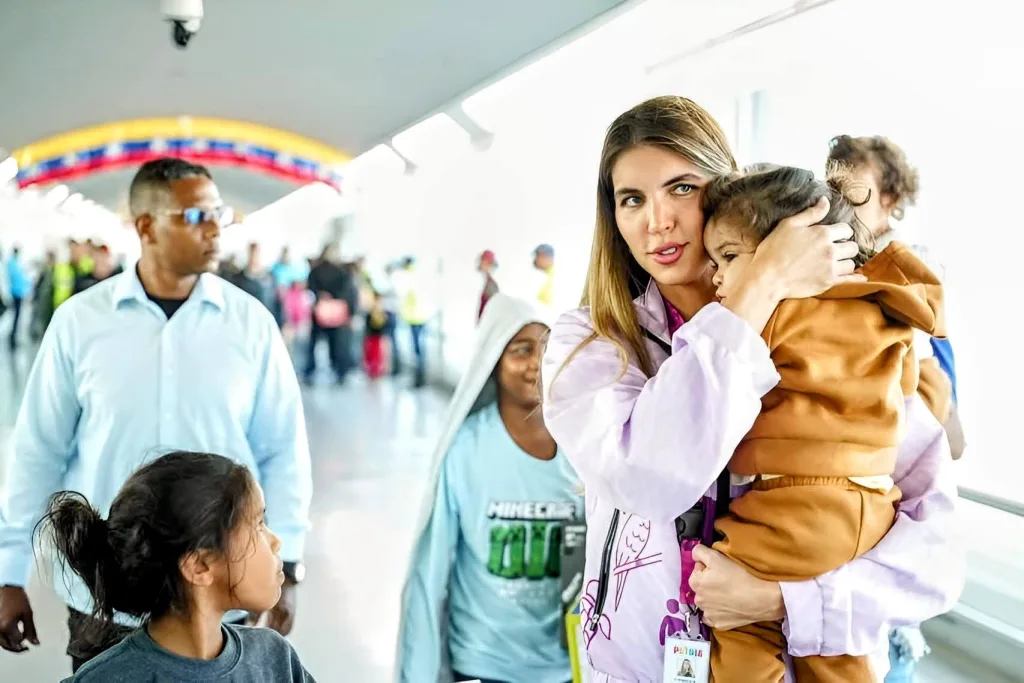
Return to the Homeland Plan President Camilla Fabri holds one of the minors reunited with their familias on Friday, Nov. 7, 2025. Photo: IG/@minjusticia_ve.

Orinoco Tribune – News and opinion pieces about Venezuela and beyond
From Venezuela and made by Venezuelan Chavistas

Return to the Homeland Plan President Camilla Fabri holds one of the minors reunited with their familias on Friday, Nov. 7, 2025. Photo: IG/@minjusticia_ve.
Caracas (OrinocoTribune.com)—Last week, Venezuela received 366 repatriated migrants from the United States on board two flights that landed at Simón Bolívar International Airport in Maiquetía, La Guaira state.
Flight number 84 of Venezuela’s Return to the Homeland Plan landed on Friday, November 7, carrying 200 nationals deported from Texas under what Venezuelan authorities describe as racist and xenophobic US policies. This group consisted of 157 men, 29 women, and 13 children.
It was preceded by flight number 83, which arrived on Wednesday, November 5, from the United States, with 166 Venezuelan migrants, including 154 men and 12 women. Both flights were operated by the US-based airline Eastern.
This week’s arrivals bring the total number of Venezuelans repatriated from the US since the program resumed in February to 16,476.
Family reunification
The president of the Return to the Homeland Plan, Camilla Fabri, along with other authorities, highlighted the case of five children on flight 84: Enmanuel Caicedo, Mia Rodríguez, Aleska Ramos, Arantza Ramos, and Aitana Ortiz. It was reported that they were forcibly separated from their parents by the US regime in violation of international law and human rights. In Venezuela, they were immediately reunited with their families to begin a new chapter in their lives.
Upon arriving in Venezuela, the relatives of the five minors thanked President Nicolás Maduro; the president of the Return to the Homeland Plan, Camilla Fabri; and Venezuelan authorities.
“Thank God, the president, and the vice minister who helped us with this return, after six months without seeing my son,” said the mother of one of the children. “So much time wondering what was going to happen, and after this long process and everyone’s help, we were finally able to bring the children home.”
The father of another girl abducted by the United States also thanked the Venezuelan government for its rescue efforts.
“I want to thank the president who made this possible,” she said. “They wanted to kidnap her in the United States; they didn’t want to give her to me. It was almost three months of captivity, it was too much of an ordeal.” Her daughter “was snatched from her hands,” she added.
The Venezuelan Interior Ministry reported that these US immigration policies constitute human rights violations and acts of coercion in which the inhumane policy of the US towards Venezuela is evident.
Venezuelan migration
Most Venezuelan migrants in the US originally left after being affected by the economic crisis between 2015 and 2020, a direct consequence of illegal US sanctions against Venezuela.
Following a massive smear campaign and incidents of xenophobic and racist violence in the US alleging that Venezuelan migrants were criminals or mental health patients, the US government began detaining and deporting them. This occurred despite the majority of migrants having no criminal record and many of them undergoing legal procedures that would permit them to reside legally in the US.
Venezuela Repatriates Over 16,000 Migrants, Denounces US Xenophobia and Racism
Return to the Homeland plan
Venezuelan authorities received the repatriated migrants following the protocols of the Return to the Homeland plan. The comprehensive care provided upon arrival includes healthcare, psychological support, and criminal, identification, and socioeconomic checks.
The Return to the Homeland plan was launched by the government of President Nicolás Maduro in 2018 to repatriate, free of cost, Venezuelans in vulnerable situations stranded abroad. The program aims at assisting those who have been victims of xenophobia and exploitation in order to ensure their dignified and safe return. It offers comprehensive support to facilitate a successful and trauma-free reintegration into Venezuelan society.
Special for Orinoco Tribune by staff
OT/JRE/SL